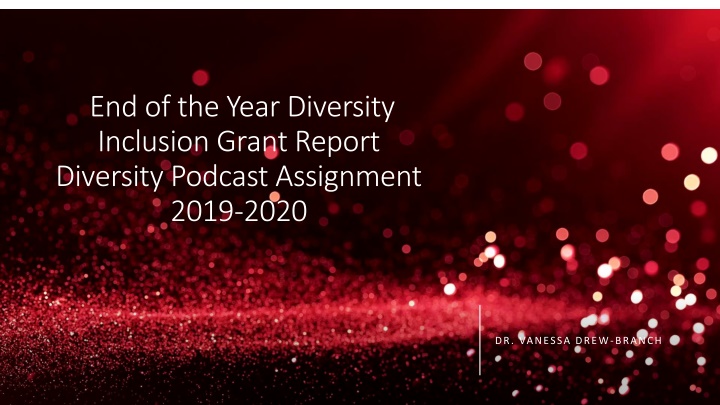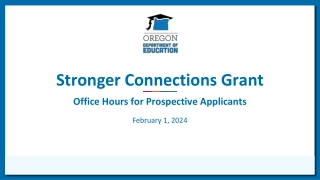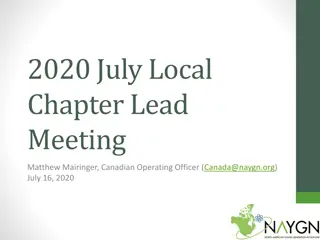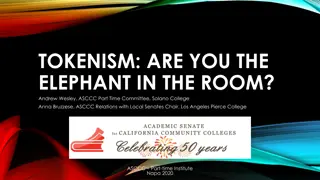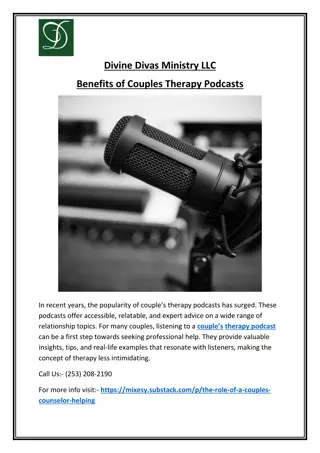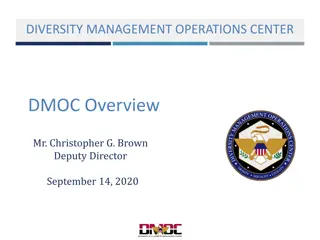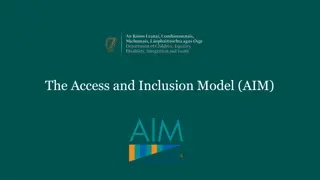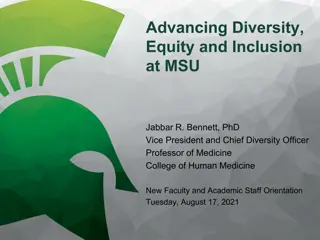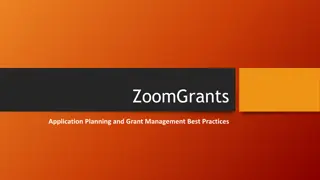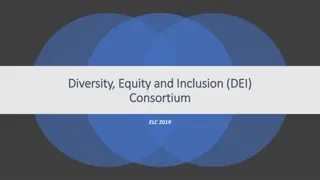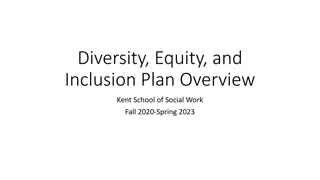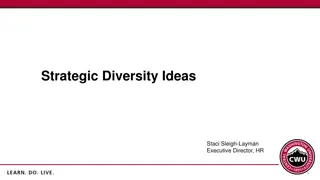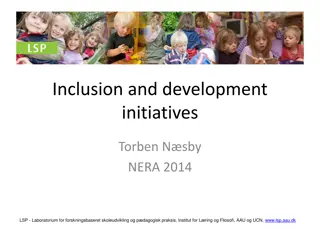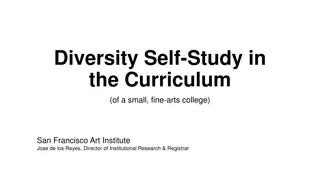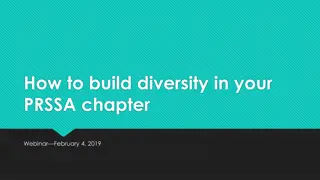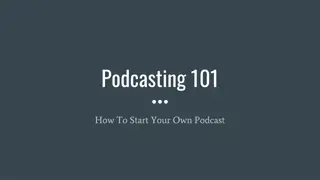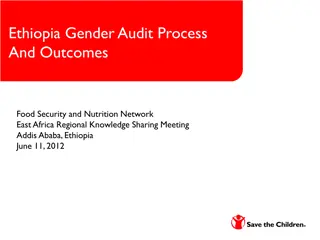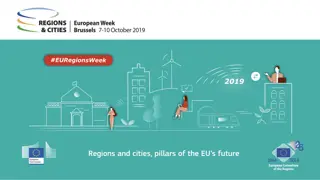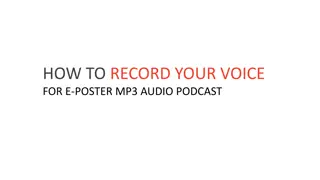Diversity & Inclusion Grant Report: Podcast Assignment Review 2019-2020
This report discusses the Diversity & Inclusion Grant report for the Diversity Podcast Assignment completed by HSS students under Dr. Vanessa Drew-Branch. The assignment included pre/post-tests, podcast groups connected to service-learning sites, and focused on sociocultural knowledge and systemic factors. Results indicate enhancements in knowledge and understanding of diverse marginalized groups.
Download Presentation

Please find below an Image/Link to download the presentation.
The content on the website is provided AS IS for your information and personal use only. It may not be sold, licensed, or shared on other websites without obtaining consent from the author.If you encounter any issues during the download, it is possible that the publisher has removed the file from their server.
You are allowed to download the files provided on this website for personal or commercial use, subject to the condition that they are used lawfully. All files are the property of their respective owners.
The content on the website is provided AS IS for your information and personal use only. It may not be sold, licensed, or shared on other websites without obtaining consent from the author.
E N D
Presentation Transcript
End of the Year Diversity Inclusion Grant Report Diversity Podcast Assignment 2019-2020 DR. VANESSA DREW-BRANCH
Diversity Podcast Assignment HSS STUDENTS TAKING HSS 111 AND HSS 481/82 WERE ASSIGNED THE PODCAST ASSIGNMENT. ALL HSS 111 STUDENTS WERE ASSIGNED THE SAME 4 READINGS RELATED TO DIFFERENCE. STUDENTS COMPLETED THE PRE-TEST PRIOR TO WEEK 3 OF THE COURSE. THE POST TEST WAS GIVEN BEFORE FINALS WEEK. STUDENTS WERE ASSIGNED PODCAST GROUPS CONNECTED TO THEIR SERVICE- LEARNING & INTERNSHIP SITE. STUDENTS COMPLETED THE ASSIGNMENT AS A FINAL PROJECT.
Contact Hypothesis Equal Status/ Common Goals Students and community partners are working together to provide a service or complete projects that serve local community. Cooperation Students, community partners and community members develop meaningful helping relationships. Supported by the Social and Institutional Authorities HSS111 and HSS 481/82 courses are designated ELRs because of their high level of community engagement. Amir, Y. (1969). Contact hypothesis in ethnic relations. Psychological bulletin, 71(5), 319.
Nonfiction podcast narratives bring to life human experience and adeptly demonstrate interpersonal terms and theories, such as stages of relationships, family communication, friendship, media richness, models of communication, communication theories, diversity, and work communication, in ways that can be analyzed by students. But why Podcast .Human Services is BOTH It is through the act of telling that we learn what an experience means to us . BOTH We learn from stories by understanding our own position within them how we are situated in the narrative and how that narrative fits with other narratives we have already heard. Art & Science Hatfield, E. F. (2018). Narrative learning using podcasts in interpersonal communication. Communication Teacher, 32(4), 236- 242.
Pre/Post-Test Survey Results HSS 111 Pre-Test 50 student surveys completed HSS 481 *HSS 481 only completed the Post test. 7 student survey completed HSS 111 Post-Test 39 student surveys completed
Survey Questions HSS 111Pre- Test HSS 111 Post-Test HSS 481 Post Test How knowledgeable are you about sociocultural characteristics of diverse marginalized groups? 3.36 2.08 2.29 Survey Outcomes: Knowledge 1=Extremely Knowledgeable 2-Somewhat Knowledgeable 3= Neither Knowledgeable nor not Knowledgeable 4=Somewhat Knowledgeable *Lower scores indicate higher levels of the perceived knowledge. How knowledgeable are you about systemic oppressive factors experienced by diverse marginalized groups? 3.16 1.82 2.29 How knowledgeable are you about systemic disparities experienced by marginalized groups ? 3.40 1.90 1.86 How Knowledgeable are you in Sociocultural issues in: Achieving equal opportunity and justice 3.22 2.03 2.57 How knowledgeable are you about historical and contemporary impact of racism, bias, prejudice and discrimination experienced by various population groups in the United States? 2.50 1.90 2.43
Survey Question HSS 111Pre- Test HSS 111 Post-Test HSS 481 Post Test How comfortable are you with eliciting the clients perspective about their life experiences in a culturally responsive manner? 2.16 1.79 1.57 Survey Outcomes: Skills 1=Extremely comfortable 2-Somewhat comfortable 3= Neither comfortable nor uncomfortable 4= Somewhat uncomfortable Somewhat uncomfortable *Lower scores indicate higher levels of perceived confidence and competence. How comfortable are you with implementing culturally responsive interventions with clients? How competent are you in how competent are you with being attentive to nonverbal cues or the use of culturally specific gestures that might have different? 2.66 1.87 1.71 2.36 1.82 2.00 How competent are you in working with working with helping professionals from culturally diverse backgrounds? 2.02 1.67 1.83 How comfortable are you with conducting a culturally responsive interview/assessments with clients? 2.30 1.64 1.43
Key Assignment Findings Students displayed a increase in their perceptions of their knowledge and skill competency from pre to post test results in most areas. The results will be used to assist the department to identify areas within the diversity content where the content can be strengthened. The Senior Post test results were very helpful to identify the areas of within the program that can be strengthened such as : Harnessing technology for social good Promoting smart Decarceration Advance long and productive lives, Aging These are areas that Seniors identified as being areas where they were least knowledgeable. The relationship between HSS 111 student Pre-test knowledge reports and Skill reports suggest that students are more confident in their abilities to work with (skills) diverse people even when they report lower levels of knowledge about the lived experiences of diverse people. Application is a higher order of thinking than knowledge. The goal is to develop ways to assist student to reorder their beliefs. Knowledge (1) proceeds Application (3)
Due to COVID-19 Global Pandemic data will not be collected for the Spring 2020 semester. Elon s shift to online course instruction, service-learning hours have been suspended has caused the course layout and the assignment to greatly modified. DIG Grant Next Steps The assignment will be implemented in the Fall 2020 HSS 111 and 481/82 courses and data will be collected.
Thank you for your time Contact Dr. Vanessa Drew-Branch vdrewbranch@elon.edu
